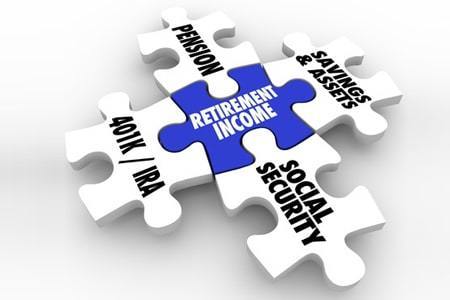When should you begin collection your Social Security retirement benefits? You can take it at anytime between age 62 and 70. What's the right choice for you? In this video we'll discuss some of the important things to think about when making this decision.
Some of the factors you'll want to consider include:
- If you are still planning to work
- What your other income is and how it's taxed Social Security is a tax advantaged income stream
- Your current health
- Your breakeven age
- If your single or married

News You Can Use
Get actionable financial advice delivered to your inbox a few times a month.
Full Transcript:
(00:00):
You can take your Social Security retirement benefits at any time between the ages of 62 and 70, but when should you write what's the right choice for you? So we're going to talk about it. We'll talk about some of the key things that you're going to want to consider in making this decision. First off, if you don't know when your full retirement age is though, take a look right here on your screen and you'll see that if you're born in 1943 to 54, it's age 66. If you're born in 55 to 59, it's 66 and some months. And if you're born in 1960 or later, it's age 67. Now, as I mentioned, you can take your benefit as early as age 62, and if we assume your full retirement age is 67, if you take it at 62, you're going to get 70% of your full retirement age benefit.
(00:52):
Let's say you take it at 63 instead, if you did that, you would get 75% of your full retirement age benefit. As you'll see on the chart each year that you delay in taking your benefit, you would get a higher amount there from Social Security. Now, only the annual increases are depicted here on the chart, but it's also important to know that each month that you actually decide to delay taking your Social Security, your benefit would increase a little bit. Now, I also mentioned you could take your benefit as late as age 70, and if you do every year that you delay past your full retirement age up until age 70, you'll earn 8% delayed retirement credits. So if your full retirement age is 67 and you decide to wait until 70 to take your benefit, your benefit will be 24% higher due to those 8% per year delayed retirement credits.
(01:50):
Now, there's no point in delaying taking your Social Security past age 70. Doesn't matter if you're working, doesn't matter anything because you're not going to earn any more delayed retirement credits. Now, what we haven't talked about here so far is the impact of COLAs, the cost of living adjustments. So let's take a look at this. Let's assume again that your full retirement age is 67, and let's say that your full retirement age benefit, your PIA, that's your primary insurance amount is $3,000. If that's the case and you take your benefit at 62, you're going to get 2,100. That's 70% of your full retirement age benefit. But if we also factor in here just a modest 2% COLA, and if you were to wait, let's say until your full retirement age, age 67, in this case, you would get $3,312. And at age 70, I'll remove me here for a second, you'll see that you would get $4,359.
(02:58):
So you can kind of see what the impact would be of those colos by making the decision to go ahead and delay. Now, here's another nice little chart so that you can see what that looks like. So let's say for example that this was you, your full retirement age of 67, and your PIA, your full retirement age benefit is $3,000. And if you had taken your benefit at age 62, by the time, let's say you're 85 years old, as you can see right there, you would be getting $3,311 if you had taken your benefit at 67. Instead, you would be receiving $4,731 and at age 70 you would now be getting $5,866. Now, there's a lot of things to consider here, and one of them of course is what is your health like? What's your longevity look like? That sort of thing. And certainly if you have some adverse health conditions and don't believe that you're going to live for a very long time for whatever reason, that could be a very strong reason to take your Social Security benefits early.
(04:12):
But if we're going to assume that you could live into your eighties or nineties like many folks will, that's where it can make a lot of sense to delay in taking your Social Security benefits. Now, you need to look at it within the context of your overall plan, meaning your other income sources, any other savings or retirement accounts that you have available to you so that you're making the wise decision on when you're going to withdraw money from those and when you're going to turn on Social Security and if you're married or not, and how all those things will factor in. One of the questions that comes up here too is, well, what if I'm in good health and maybe I'm still working or I'm not working, but I have enough other money in retirement accounts or something and I don't need the money from Social Security, maybe I'll just take it and invest it.
(05:07):
And that's an option. You can do that. I will say you have to earn a pretty high rate of return in order for that to make sense. And you have to also think about what the impact is of taxes, any capital gains or dividends or anything like that, depending on what you're investing in and how that works. The other thing too that you'll want to consider is remember that Social Security is a tax advantaged income stream. And what I mean by that is that if Social Security is your only source of income, you don't pay taxes at all. At least not on the federal level. There's only, I believe 12 or 13 states now that tax it. But when we talk on a federal level, it's only other income that could potentially make it taxable. And many retirees aren't paying taxes on a lot of their Social Security.
(06:01):
Even if you make $10 million a year, you have a super high income, you'll still never pay taxes on more than 85% of your Social Security benefits. Okay, I've done another video or two in the past where we talked about the provisional income formula and specifically how that works. But it is so important when you're making your decisions on when you're going to take Social Security, that you are thinking about it in context of your other income sources and how those other income sources are going to be taxed when you receive it. Is it ordinary income, are they capital gains? Are they tax-free, such as the Roth IRA? What's the situation there? So need to look at it within the context of the plan. And another real important thing to consider here is if you're still planning to work and you haven't yet reached your full retirement age, you have to be aware of the earnings test because if you're working, either all or some of your Social Security benefits could get withheld.
(07:05):
And as you'll see here, let's say that you're 62, you decide to go ahead and turn on your Social Security and you're still working. Well, $1 in benefits will be withheld for every $2 that you earn over 22,320 in 2024. So these numbers typically adjust upward these threshold numbers, but that's how that works. And if those benefits get withheld, it's not like they're completely gone, but once you reach your full retirement age, they will credit you with a positive adjustment to your monthly benefit then going forward. But it is important to know how that works, that there is that earnings limit or that earnings test as we're referring to it here. Also in the year of your full retirement age, but before the month of your actual birthday, they'll still withhold perhaps, but the rules are a lot more lenient. You can make up to $59,520, and they'll only withhold a dollar for every $3 above that limit.
(08:10):
So again, they'll credit you with a positive adjustment once you get to your full retirement age for any benefits that were withheld. But you do need to be aware of how that works. So there's a lot to consider here. We talked about taxes, the coordinating of different income streams and things like that that you might have available to you. That's important. If you don't have other sources of income in retirement, the decision on when you're going to take Social Security becomes a lot simpler. And typically the time that you retire is if you don't have other money available, then you've got to turn on your Social Security. Although one other thing to consider here is that if you're married, you want to think about the decision on when you're going to collect your Social Security in thinking about your spouse here as well. Because remember, when one spouse passes away, the surviving spouse is going to lose a Social Security check.
(09:11):
You'll lose the smaller one. You'll keep the larger one, but nevertheless, that smaller check is now gone. So let's say that this is you and you're thinking about should I delay taking my benefit? And let's say that your benefit is the higher one. Well, that could be a case why you might want to go ahead and delay taking that because that way you're maximizing that future survivor benefit for or whoever survives the other. So hope this has been helpful. This is definitely not designed to be all inclusive. You have to think about these things within the context of your overall plan. But if this has been helpful, make sure you like the video, make sure you subscribe, and I'll see you soon.
